 About Us - Galexia News
About Us - Galexia News
2018 Global Cloud Computing Readiness Scorecard released - 6 March 2018
Our latest research report has been released - The 2018 BSA Global Cloud Computing Scorecard (a joint research effort between BSA | The Software Alliance and Galexia) ranks the cloud computing readiness of 24 countries that account for 80 percent of the world’s IT markets. Each country is graded on its strengths and weaknesses in seven key policy areas. This is the 4th in an updating series - previous reports were released in 2012, 2014 and 2016.
The 2018 BSA Global Cloud Computing Scorecard — the newest version of the only global report to rank countries’ preparedness for the adoption and growth of cloud computing services — features an updated methodology to better reflect cloud computing’s exponential growth over the past five years, putting additional emphasis on policy areas, including privacy laws, cybersecurity laws, and broadband infrastructure. Most countries continue to make improvements, the study finds, but some markets are falling further behind.
By examining the legal and regulatory framework of 24 countries, the Scorecard aims to provide a platform for discussion between policymakers and cloud service providers. This dialogue can help develop an internationally harmonized regime of laws and regulations that facilitate cloud computing.
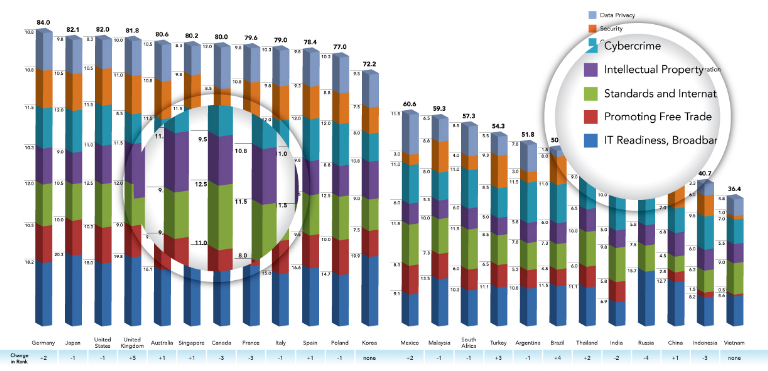
![[ Galexia Dots ]](/images/hr.gif)
|
(BSA | The Software Alliance Global Media Release - 6 March 2018 - Washington) Report: Cloud-Enabling Policies Drive Economies, While Data Localization Requirements Hinder Growth WASHINGTON — March 6, 2018 — Cloud computing is becoming more and more integral to every nation’s economic growth. The increasingly adopted technology powers global businesses and helps governments better connect with their citizens on a daily basis. It follows, then, that countries with policies that promote cloud computing services will increase their productivity and advance their economy. The 2018 BSA Global Cloud Computing Scorecard - the newest version of the only global report to rank countries’ preparedness for the adoption and growth of cloud computing services - features an updated methodology to better reflect cloud computing’s exponential growth over the past five years, putting additional emphasis on policy areas, including privacy laws, cybersecurity laws, and broadband infrastructure. Most countries continue to make improvements, the study finds, but some markets are falling further behind. Germany scored the highest on the Scorecard - due to its national cybersecurity policies and promotion of free trade - followed closely by Japan and the United States. Bringing up the rear are a small group of nations that have failed to embrace the international approach: Russia, China, Indonesia, and Vietnam. In terms of overall ranking, the biggest improvers were the United Kingdom (moving up five places) and Brazil (moving up 4 places). The Scorecard’s key findings include:
By examining the legal and regulatory framework of 24 countries, the Scorecard aims to provide a platform for discussion between policymakers and cloud service providers. This dialogue can help develop an internationally harmonized regime of laws and regulations that facilitate cloud computing. “The Scorecard is a tool that can help countries constructively self-evaluate their policies and determine next steps to increase adoption of cloud computing,” said Victoria Espinel, President and CEO of BSA | The Software Alliance. “Cloud computing allows anyone to access technology previously available only to large organizations, paving the way for increased connectivity and innovation. Countries that embrace the free flow of data, implement cutting-edge cybersecurity solutions, protect intellectual property, and establish IT infrastructure will continue to reap the benefits of cloud computing for businesses and citizens alike.” The full, 24-country rankings and detailed findings are available at www.bsa.org/cloudscorecard. |
![[ Galexia Dots ]](/images/hr.gif)
The BSA Global Cloud Scorecard analyzes the legal and regulatory framework and broadband infrastructure of 24 countries that together make up 80 percent of the global ICT market. The analysis is grouped under seven policy categories that are central to the growth and operation of cloud computing.
The study includes a detailed country-by-country analysis of legislation, regulations, case law, government policy and standards. The assessments include an evaluation of enforcement and implementation of existing laws in each country, as well as an assessment of compliance with relevant treaties and global agreements where applicable. The Scorecard analysis is based upon a combination of published information and statistics and evaluation by independent experts at Galexia.
Each country's score is computed using a 72-item scoring grid and analyses. The scores are derived using a weighted system that allocates different weights to each section/question. A number of basic fact-finding questions are excluded from the scoring system. Each group of questions is weighted to reflect its importance to cloud computing and each individual question is also weighted to reflect its importance within the group. To help with the scoring and usability of the study, the assessments are based on a series of questions that are framed so that a "yes" response reflects a favorable policy setting for global cloud computing. The weights are shown in the table below and the results are available in the downloadable report.
Download the 2018 Scorecard and 24 Country Reports
- Galexia micro-site with additional analytics » (released May 2018)
- BSA Global Cloud Computing Score Card (2018) micro-site (external site)
![[ Galexia Dots ]](/images/hr.gif)

![[Data protection regulations and international data flows: Implications for trade and development (April 2016)]](/public/ssi/pubs/pub_6.png)

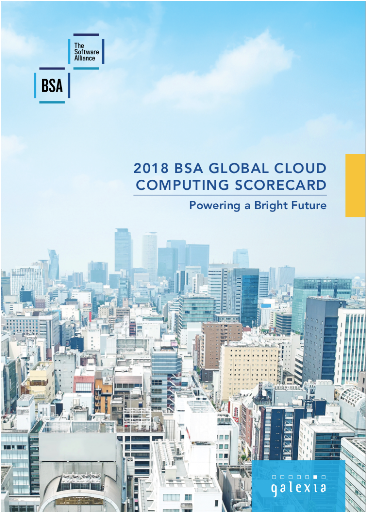
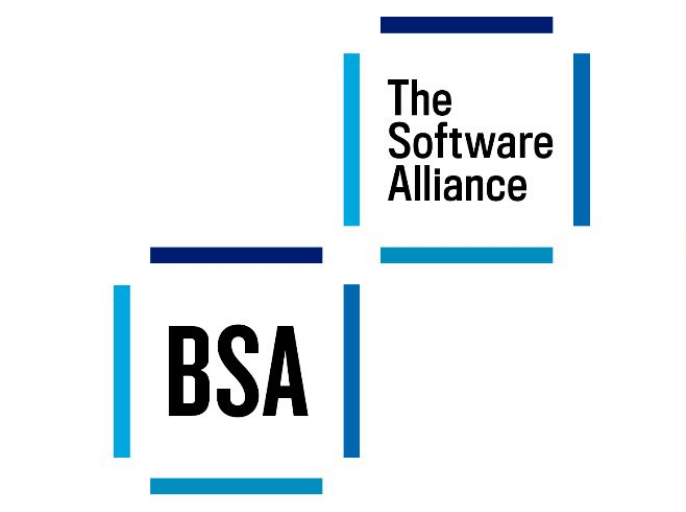
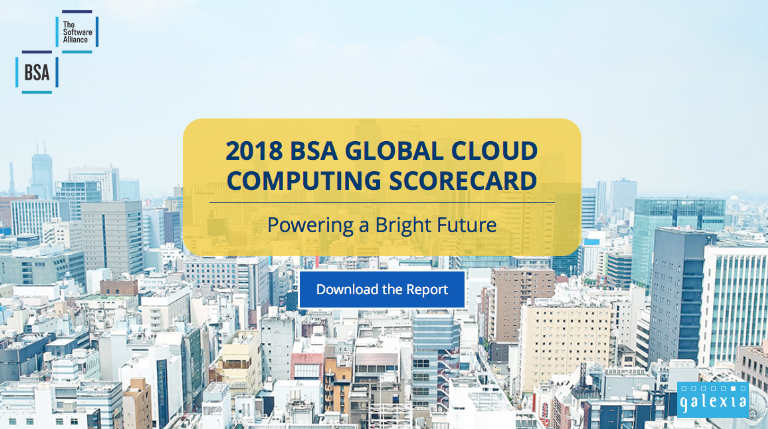
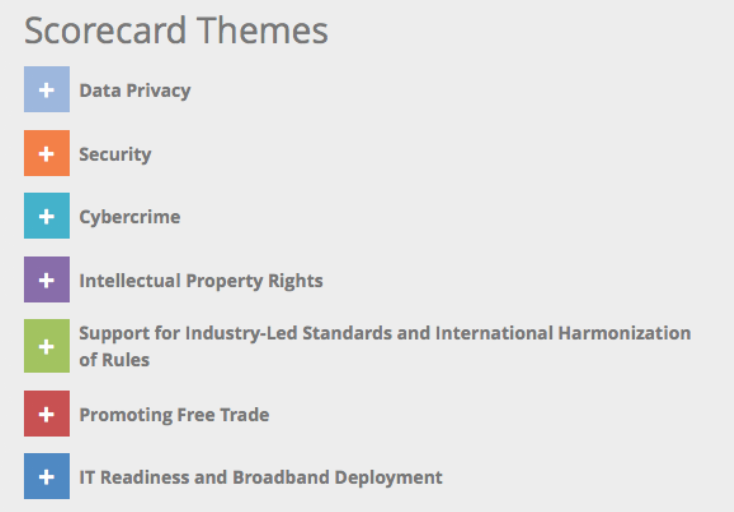
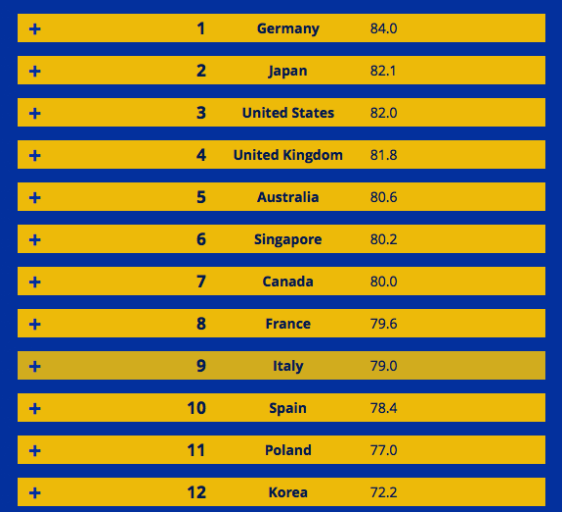
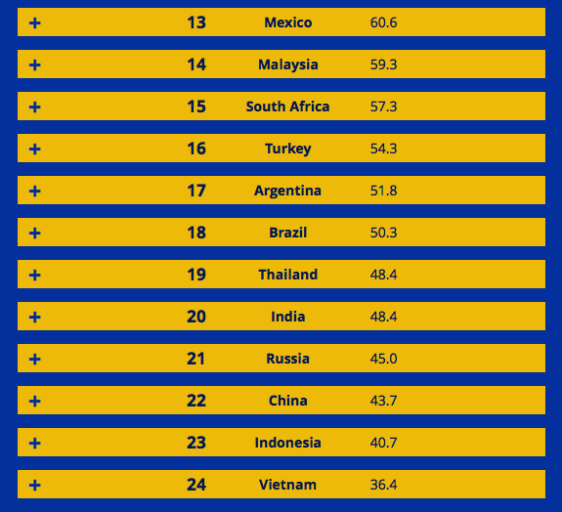

 print this page
print this page sitemap
sitemap manage email subscriptions
manage email subscriptions